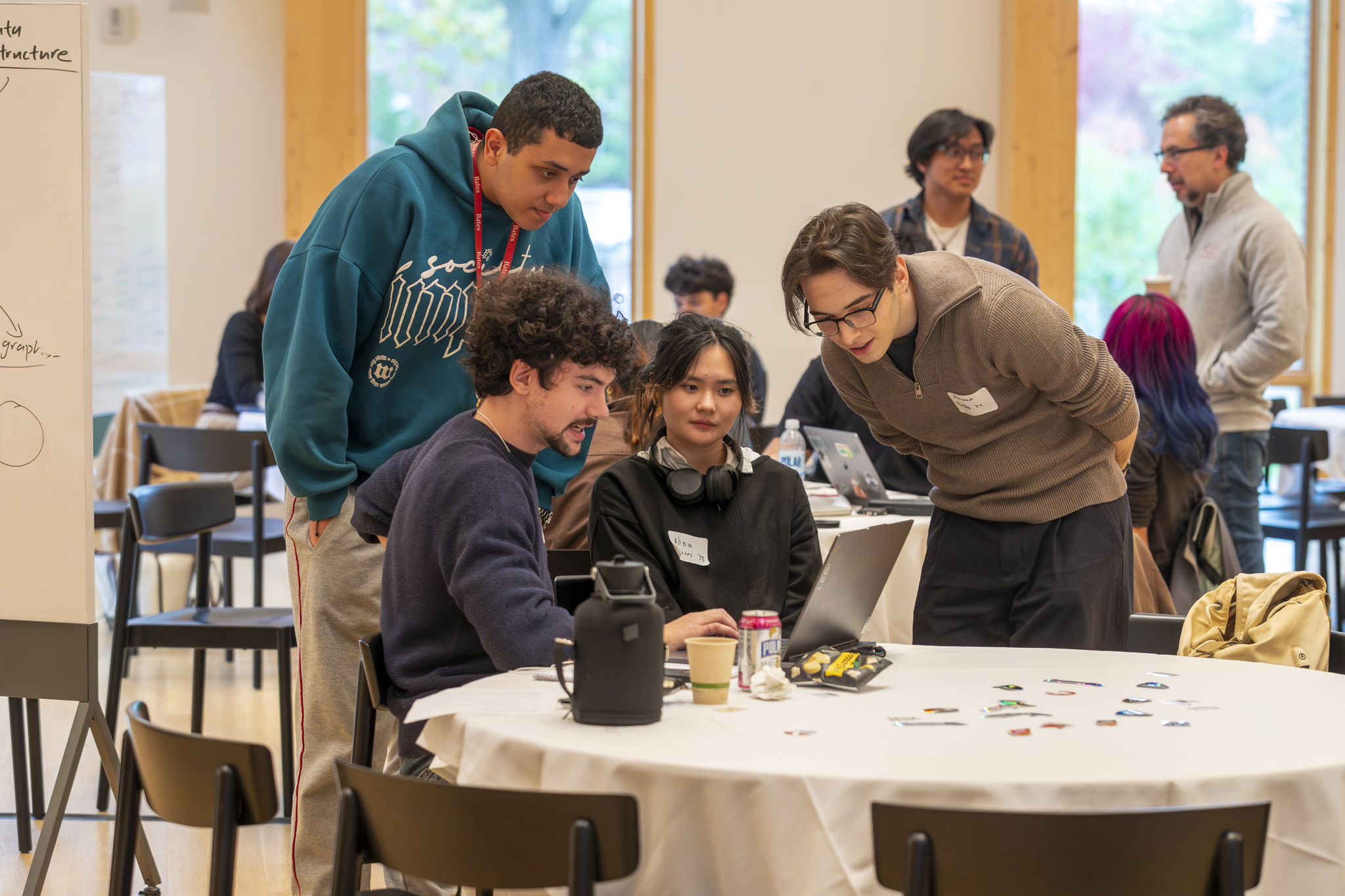Students explore innovative AI use for the common good at Generative AI Hackathon
October 24, 2025
 Courtesy of Bowdoin Communications
Courtesy of Bowdoin CommunicationsAs the College responds to the increasing use of artificial intelligence (AI) technologies in the classroom, it is offering more opportunities for students to engage with these technologies and leverage them for the common good. On October 14, approximately 60 students from Bowdoin, Bates and Colby participated in a Generative AI Hackathon sponsored by the Hastings Initiative for AI and Humanity and the Office of Career Exploration and Development (CXD).
Open to students of all backgrounds and experience levels, the goal of the Hackathon was to encourage participants to explore AI without facing any barriers to access. Visiting Lecturer in Computer Science Christopher Martin organized the event with the support of the CXD and Information Technology offices, emphasizing exploration, innovation and collaboration over competition.
“The hope was to just give people who attended a chance to just have unfettered access to whatever they wanted to do and actually get hands-on experience,” Martin said.
Industry experts—from alumni who actively develop AI systems to software engineers who use AI every day—offered workshops during the event that prompted students to critically consider different perspectives around AI use and ethics.
“It really was meant to be that very pure space that would enable exploration, experimentation and to foster that creativity,” Martin said.
Students were encouraged to interact with AI tools as a way to approach real-world problems. Along with team members Eva McKone ’26 and Oscar Martinez Mendoza ’29, Sophia Naumov ’28 developed a web app to encourage climate action among Bowdoin students.
“The main goal of [our app] is to help track your carbon footprint and reduce the amount of carbon emissions as well as the amount of water that you’re using,” Naumov said.
The app allows users to track their actions that promote sustainability, like bringing a reusable water bottle or attending a sustainability event. Users can also choose to add friends and compete on a leaderboard.
“It helps you see how everything you do in your daily life really makes an impact in the world…. For each of those actions that you do, you get points, and then with the more points you have, your [virtual] garden grows,” Naumov said.
After attending the workshops and utilizing the resources offered at the Hackathon, Naumov’s team was able to figure out how to harness AI tools such as LibreChat and Lovable to develop their project, even though none of them had prior coding experience.
“We attended one of the workshops toward the beginning of the day, and through hearing what they were saying, we were really able to figure out what to do with our project and how to use AI within the project,” Naumov said. “By allowing those speakers to come talk to us when we were actually working on it and get feedback on our project, we got so many insights that we never would have thought of.”
In exploring how AI can be used to solve concrete issues, Naumov and her team members focused on inspiring change toward sustainable development.
“We were researching the United Nations’ [(U.N.)] sustainable development goals, and through researching those, we decided to focus on a few of them to help,” Naumov said. “Through that, [we thought] we could successfully inspire other people to educate [them] to learn about those goals from the U.N. and see how they can impact the rest of the world and make an impact in daily life.”
Hearing from industry professionals and gaining hands-on experience with AI at the Hackathon helped shape Naumov’s view of its future use toward promoting the common good.
“The biggest takeaway for me is to not be scared of AI, but instead learn how to use it properly because it’s a tool that’s going to be here regardless,” Naumov said. “Learning how to use it for good is so important because it is a learning process. Even when we were designing our app, we had to realize how specific we needed to say things and what types of things AI likes to hear and use as well, versus what things it misinterprets.”
For Martin, the Hackathon was an opportunity to promote “cross pollination” of ideas to foster innovation and creativity across disciplines, provide exposure to AI technologies and allow students to see what is possible.
“This was a very pure cross-disciplinary, cross-campus, college effort,” Martin said. “I think that it’s really good to touch on that as well, even to say this was not just computer science people coming together for another one of their ‘Hackathon things.’ It was something that was a little more special than that.”
According to Martin, the Hastings Initiative will continue to promote interdisciplinary collaboration in future events that engage with AI, especially through events that target a wide range of students with varying interests and experience levels.
“This is such a unique opportunity that Bowdoin is giving us, and I think just harnessing it [is important],” Naumov said. “I assume there are probably going to be more events like this in the future. I think everybody should try to attend one, because you learn so much, and [AI] is something that is so prevalent. It’s so important to learn about it, even if you’re not tech-focused.”

Comments
Before submitting a comment, please review our comment policy. Some key points from the policy: